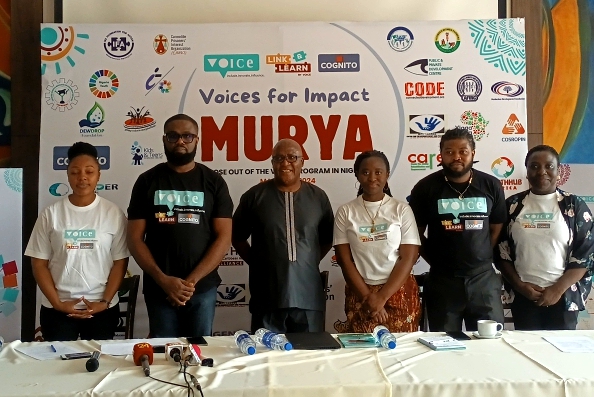Abuja, Nigeria – The Voice Project, a groundbreaking initiative aimed at promoting the rights and inclusion of marginalized groups, has made a significant impact over the past eight years, touching the lives of over 2 million Nigerians. This was revealed during the Voice Close Out Press Conference held on Friday, where key leaders from Voice Nigeria and the media gathered to celebrate the project’s achievements as the second phase of the Close Ceremony that took place at Abuja Continental Hotel on Thursday.
Akom Nya, the Voice Nigeria Project Coordinator, emphasized the innovative nature of the Voice Project, describing it as a grant facility that enhances access to resources, participation, and rights for marginalized groups in Nigeria. “The ‘Nothing about us without us’ (Now-Us) mantra of the Voice Project is a testament to the fact that in the realm of human rights, everyone has a voice, and all voices matter,” Nya stated.
He elaborated on the project’s empowering approach, highlighting that the term “rightsholder” reminds us that rights reside with the people. The role of the Voice Project has been to support these rightsholders in upholding, amplifying, and advancing their rights.
Since its inception, the Voice Project has been implemented in ten countries across Southeast Asia and Africa, including Nigeria. It has engaged directly with 51 organizations and indirectly with over 150, impacting more than 50 communities across Nigeria, including universities, custodial centers, rural settlements, and urban slums.
John Makina, Country Director of Oxfam, Nigeria, noted that the Voice Project was implemented with support from the Ministry of Foreign Affairs of the Netherlands. “Since its launch on January 17, 2017, Voice has directly funded organizations working with rightsholders through four grant categories: Innovate and Learn Grant, Sudden Opportunity Grant, Empowerment Grant, and Influence Grant,” Makina explained.
The project has not only provided funding for specific initiatives but also facilitated a unique Linking and Learning approach. This has enabled grantees and rightsholders to share knowledge and experiences, fostering a collaborative environment for sustainable community building.
Voice Global Representative Anne Mulehi highlighted the financial scope of the project, revealing that over 4 million euros have been allocated to various organizations under the Voice Project in Nigeria. “The project funded initiatives ranging from amplifying the voices of people in correctional centers and persons with disabilities to empowering indigenous women and youth challenging the status quo through their talents,” Mulehi said.
Specific projects included addressing issues such as “Sex for Grade,” empowering female prisoners economically, using movies to raise societal consciousness, and advocating for social change through art. The project also supported young people running for political office, advocated for the end of violence against women, and enhanced access to air transportation for persons with disabilities.
Cedric Owuru, the Voice Linking and Learning Amplifier Officer, stressed the importance of the Linking and Learning component. “It provides opportunities for grantees to network, share ideas, and strengthen capacities. This approach is at the heart of Voice, promoting collaboration and innovation to catalyze transformative change for the most marginalized and discriminated groups,” Owuru explained.
The project’s commitment to continuous learning and improvement was evident through activities such as coaching sessions, Communities of Practice (CoP), and the development of a knowledge management platform. This platform houses all activities of the grantees, culminating in over ten published books and numerous documents, including the recently published “MURYA,” which captures the project’s impact over the past eight years.
Christy Asala, Executive Director of Cognito, the organization that facilitated the Linking and Learning component, praised the project’s success. “We have facilitated four thriving Communities of Practice, hosted six Link and Learn events, and conducted 30 coaching sessions. Our efforts have created an environment where all participants feel free to share, learn, and grow,” Asala said.
Among the Communities of Practice developed were the Elderly CoP, which produced the “Eldercare Research and How To Guide,” the Persons with Disabilities CoP with the “Compass to Disability Inclusion,” and the Social Justice CoP, which compiled a comprehensive “Compendium of Learnings.”
The Voice Project’s extensive reach and impactful initiatives underscore its critical role in advancing the rights and inclusion of Nigeria’s most vulnerable populations. As it concludes, the project’s legacy of empowerment and advocacy continues to inspire and drive forward the mission of inclusivity and human rights for all.


